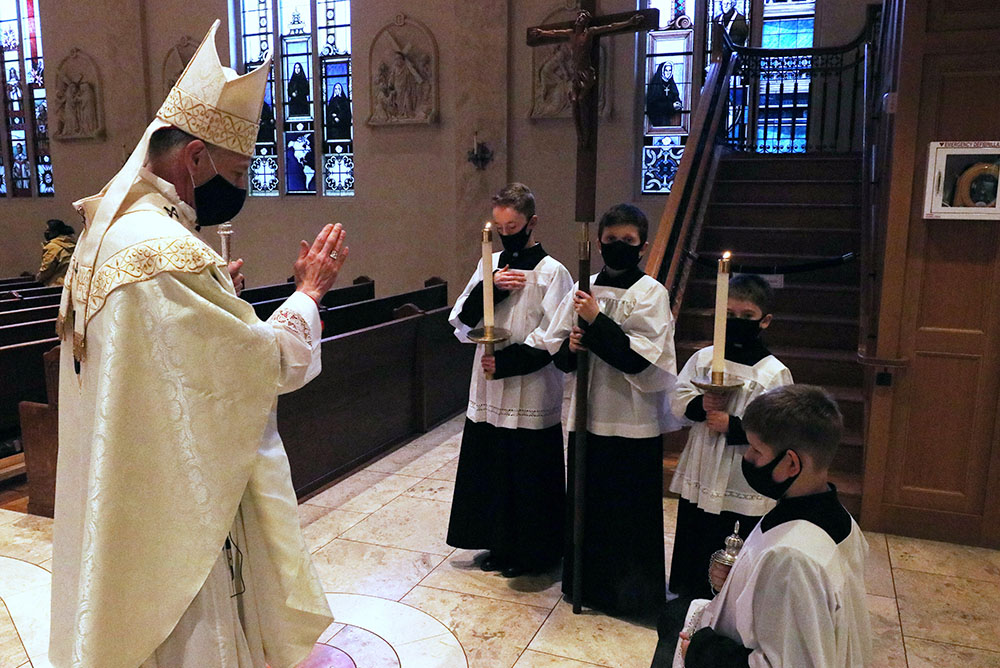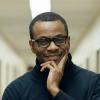
(Dreamstime/Faithiecannoise)
On Jan. 25, Archbishop Alexander Sample of Portland, Oregon, released a policy directing Catholic institutions in his archdiocese to interact with young people on the basis of their "biological sex identity, rather than self-perceived gender identity."
The date of the release of the policy is significant. It commemorates the conversion of Saul, who later became Paul, the great apostle to the gentiles.
Too often, we think of conversion as something that orients us to a type of truth that derives its validity from a logical argument. But this is how we tend to get it wrong. Conversion is rooted in God's invitation to us to encounter a God-beyond-reason.
It is from that locus of the God-beyond-reason that God invites all to reorient themselves away from the logic of the head to the illogicality of encounter.
Vulnerability is a legitimate response to the invitation to encounter God. I am using vulnerability to shed light on the fact that one does not always have a clear understanding of how God manifests God in the unfamiliar.
Yes, the church locates its teachings on a tradition. However, this tradition is a living one. Like all living traditions, it must grow.
Over two decades ago, if someone had asked my opinion on the phenomenon of fluid gender awareness, I would have opined that such a phenomenon was either immoral or disordered. However, I have encountered many persons who have shared with me their life successes, stories and struggles as they attempt to make sense of who they are.
Through these encounters, I have come to the realization that perhaps, our theological views that offer rigid meanings to what is not of its nature rigid is where the problem lies.
It is noticeable how the church tends to frame the conversation around gender and sexuality as though they are solely within the domain of cognitive awareness. For example, the opening lines of the guidelines offered by Sample use the term, "to conceptualize" in relation to a person's gendered self-understanding.
From my experience of the discourses around gender in ecclesial circles, I have come to the realization that there seems to be a lack of awareness of the phenomenological nature of gender. Gendered self-understanding is not within the domain of conceptualization. Rather, it is within the domain of sociocultural and political constructions of identities.

Archbishop Alexander Sample of Portland, Oregon, blesses altar servers after the Mass for the feast of St. Joseph March 19, 2021, at St. Mary's Cathedral of the Immaculate Conception in Portland. (CNS/Catholic Sentinel/Ed Langlois)
Reading the document that first came out from the Vatican's former Congregation for Catholic Education in 2019, titled " 'Male and Female He Created Them.' Towards a Path of Dialogue on the Question of Gender Theory in Education," alongside the pastoral guidance from Sample, one notices a conflation of the understanding of gender and sexuality as though they are interchangeable and they have the same meaning.
Or maybe it is better to say that there is a disregard of findings outside of the literal reading of the Genesis account. Yes, the church locates its teachings on a tradition. However, this tradition is a living one.
Like all living traditions, it must grow. It must allow itself to be critiqued in order for it to embrace fully the Spirit-centered calling of reading the signs of the times.
To read the signs of the times means that the church is open to critique itself as it critiques society. This dual nature of reform was well-articulated by Pope St. John XXIII in his 1959 encyclical Ad Petri Cathedram. This type of positionality is how a tradition is said to be alive and responding fully to the promptings of the Spirit.
On another note, much work has been done by experts from several disciplines to show how gender is a sociocultural and political marker of identity constructions. (For example, in the works of Simone de Beauvoir, Judith Butler and Ifi Amadiume).
The work of the church is to have large ears and eyes to ensure that it hears all perspectives, and sees all whom it encounters, so that it can be able to reflect and teach in such a way that all the issues at stake are addressed.
Work has also been done to highlight the differences between gender and sexuality, for example, in this essay by Cynthia Vinney.
Too often, the church tends to conflate gender and sexuality. This is particularly true in the document released by the Vatican in 2019. This conflation continues to be reflected in the diocesan adoptions and implementations of that text.
Whether this is based on lack of nuanced awareness on the subject matter or a persistent embrace of a particular understanding of gender and sexualized identity, one cannot say. However, it ought to be stated that the work of the church is to have large ears and eyes to ensure that it hears all perspectives, and sees all whom it encounters, so that it can be able to reflect and teach in such a way that all the issues at stake are addressed.
To ignore the findings of experts is to go against the core epistemological approach that defines the church's usage of the natural law tradition.
While it is the monopoly of God to know exhaustively the eternal law, on the part of us humans a gradual awareness of eternal law plays itself out in the domain of natural law. This participation in God's eternal law is never done in abstraction. In fact, it is within the domains of culture, experience, language and context that such participation plays itself out.
Role of discernment
We come to know God's truth through the way God mediates God's self-revelation through all that God creates. However noble this truth may be, it does not deny the fact that the mediative roles of culture, experience, language and context are not devoid of the politics of erasure. This is why discernment is needed, and even an application of exegetical critique is required.
Furthermore, God did not reveal God's truth in the abstract. Rather, God uses nature to reveal God to nature. Our reading of nature is always political. It can sometimes conceal, distract from, or contradict the content of God's self-revelation.
Advertisement
These said, it can become problematic when we read Scripture only through a literal lens. Without denying the claim that the Bible speaks of humans using dualistic framework — male and female — this is not to be taken without a critical engagement.
The critical engagement can be couched in the following questions:
- What does it mean to be male or female in the era when the texts were first written, especially in the communities where the texts were written and received?
- How does that understanding reflect in the progress or regress of human history?
- Whose experiences were left out and whose experiences were centered?
This is why biblical exegeses cannot be absent in how ecclesial leaders teach the tradition when they appeal to sacred texts. Even the tradition itself ought to be critiqued because if it is rooted in fidelity to the Spirit, the human elements of power dynamics, erasures and politics ought to be shed light on as well.
When we speak of the development of doctrine, we must understand that the epistemic movement in such a process calls for the pruning of the tradition where the doctrine finds its home.
We see this at play in the early church's Christological debates. Lack of clarity demanded that what was not clear needed to be restated in a manner that those living at that particular epoch understood what was being received.
We ought to recognize that our understanding of God's truth is always limited and does not exhaust the content of the truth itself.
Reception is how the church orients itself to the Spirit so that a rich reading of the signs of the times can be embraced. Teaching and reception go hand in hand, else, teaching becomes meaningless.
To teach and to receive correctly, we must center what I call having an empty seat in our heads, our hearts, our imaginations and our didactic renditions of what we understand to be the truth. Simply stated, we ought to recognize that our understanding of God's truth is always limited and does not exhaust the content of the truth itself.
In order not to become an idol of god unto ourselves, having that epistemic empty seat allows for the reception of the illogical aspect of God's truth.
I do think that this is what is at play when John XXIII insisted that the church embrace the coming Second Vatican Council in a spirit of aggiornamento. To open the windows of our churches and of our hearts and heads is to allow the sometimes forgotten and unfamiliar fresh air of the Spirit to be experienced and received.
What does this have to do with gender theory and the directives from some of our ecclesial leaders?
Each of us can only speak experientially to the gender and sexual orientation that we are familiar with. For those who experience consonance between their sexuality and sociocultural and politically constructed gender, a sense of comfort will always be the locus from which the discourse begins. This does not mean that their reality is the only way all humans experience themselves.

Pride flags hang in the windows of City Hall in Portland, Oregon, in this undated photo. (Dreamstime/Alexander Oganezov)
For those who may experience a dissonance between their sexuality and sociocultural and politically constructed gender, their awareness of self does not exhaust the content of how all humans understand themselves.
As followers of Christ, when we embrace the positionality of having an epistemic empty chair in all the spaces we occupy, whether in our faith expressions, ritual spaces or educational loci, we are intentionally creating room for all that we are yet to fully understand.
We cannot simply reject what we consider to be unfamiliar. To do that is to miss the key lesson of conversion that is rooted in God's invitation to us to encounter the risen Christ.
The risen Christ resides in the unfamiliar narratives of gender and sexual orientations. Their unfamiliarity ought to be the spark for a Spirit-centered question: What is God revealing to us as Christ's followers so that we can be truly present with our neighbors on our collective journey of life?
Proclamation of the Gospel is about accompaniment of all persons. It entails a slow embrace of the temptation to judge the other because they are different. It is first and foremost about radical acceptance of the other while being curious to know why they are the way they are.
It involves questioning what we take for granted because the other who is different is also a child of God and demands of us that we embrace first the praxis of understanding before turning to the ritual of judgment, which may not even be necessary.
Our institutions of learning are places where we can truly practice this radical embrace of suspension of judgment and honor the praxis of curiosity to understand what is going on in the lives of our children and siblings. When we put in place policies that reject the findings of other disciplines, we are saying that the marriage of the heart and mind that defines a healthy way the church can respond to the signs of the times means nothing anymore.






